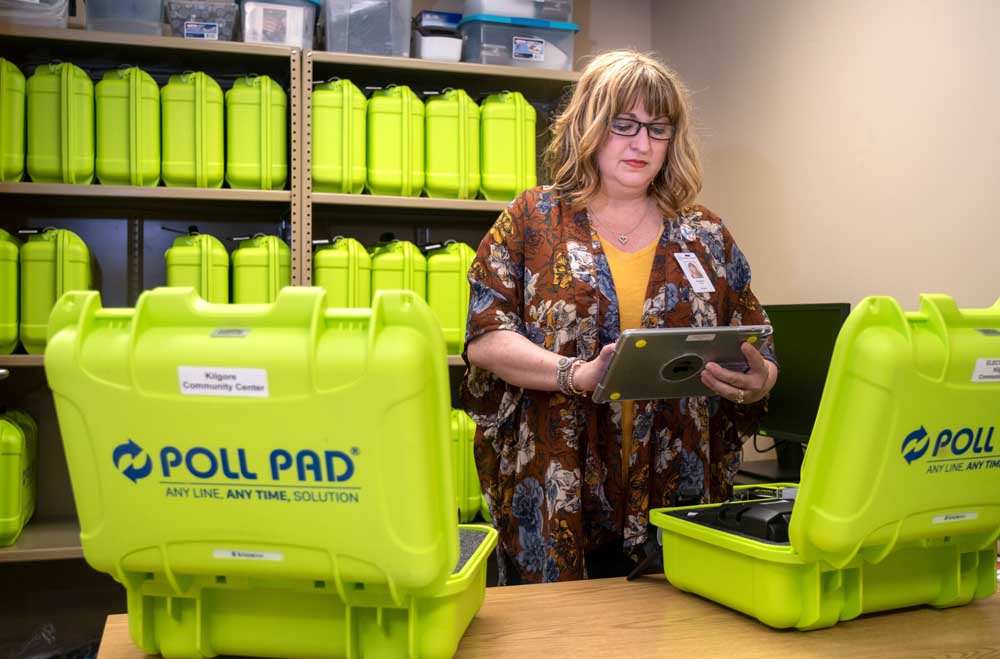East Texas elections officials say bill limiting countywide voting would hurt turnout, bring ‘unnecessary’ costs
Published 5:35 am Tuesday, April 25, 2023

- Gregg County Elections Administrator Jennifer Briggs works in March 2021 at the courthouse.
Top elections officials in East Texas say a bill working its way through the Texas Legislature that would end Election Day countywide balloting is unnecessary and will cost taxpayers money.
The Texas Tribune reported Senate Bill 990, if approved by the Texas House and signed into law by Gov. Greg Abbott, “would eliminate countywide voting centers on Election Day and require residents to vote at an assigned precinct, typically in their neighborhood.”
The bill wouldn’t apply to early voting.
A countywide voting center allows residents to cast a ballot at any polling location in their county, regardless of which precinct they live in. Gregg and Smith counties are two of 90 counties in the state approved by the Texas Secretary of State’s Office to use countywide balloting.
The bill’s author, Republican Sen. Bob Hall of Edgewood, said the bill is necessary to address potential issues with vote counts, according to the Tribune.
Hall said spreading voting locations across a precinct makes it “impossible” to ensure an accurate count and that limiting voters to a central polling location would simplify the tally, the Tribune reported.
Jennifer Briggs, Gregg County elections administrator, said the county has never had issues with incorrect vote counts. Any minor issues found by the ballot board are usually attributed to faulty mail-in ballots, she said. The suspect ballot is immediately removed from the count total to keep the number accurate.
It’s also easy for elections officials to print reports from tally machines, Briggs said. The reports show vote totals not only by polling location but also by precinct.
Briggs said countywide balloting is popular during early voting, and a law that would prohibit it on Election Day is unnecessary.
“Adding one more day (of countywide voting), it’s the same for us,” she said of the elections office.
In Smith County, elections administrator Michelle Allcon shared that sentiment.
“Early voting is already countywide, so I don’t understand why they say adding one more day to that … would make it more difficult to create an accurate count,” Allcon said.
Allcon said authors of the bill should take poll workers’ perspectives into account.
“They might picture an election taking place a certain way, but if they don’t actually work an election or participate as poll watchers, then they really don’t know the reality behind it,” Allcon said.
Briggs and Allcon said feedback has shown voters enjoy the ability to vote anywhere close to them.
Both local officials said the bill not only would make it harder for elections officials but also for voters. Briggs gave an example of voters who get off work late and would be forced to drive across the county to a precinct-designated balloting location.
“It makes it a lot harder for that person to vote when they could vote near where they’re working by going to a countywide place,” Briggs said.
Allcon agreed countywide voting is convenient for voters.
“Currently, a voter can go to any of the polling places within our county during Election Day and cast their ballot,” Allcon said. “So if they are able to stop on the way to work or during their lunch break, or after picking up their kids from school, they can do that wherever they happen to be.”
Allcon said if the bill ends up being passed into law, it will limit a voter’s ability to vote and ultimately make the process more difficult than it needs to be.
“I think it would make voting more difficult for voters. I think it would actually hurt our voter turnout and make voters less likely to actually be able to cast a ballot for a couple different reasons,” Allcon said. “The main reason I think it’s not very helpful for the voters is that it will mean a voter has to go to one specific location. So if we go back to precinct-based voting, we might have 72 voting polling places on election days. However, out of those 72 places, only one would be open to the voter. So if that voter goes to the wrong place, he wouldn’t be able to cast his ballot. He would have to leave to go to a different location to be able to cast a ballot and have a count.”
Briggs and Allcon both cite the issue of more open polling locations equating to needing more staff, therefore costing taxpayers.
“We would have a lot of problems finding the number of workers needed,” Allcon said. “If we have 72 polling places on Election Day, each of those polling places needs a minimum of three workers, according to the Texas law, which would be about 200, 225 workers. This past November, I think we had right around 180 workers total — and that was difficult to find.”
Not only are these workers hard to come by, but they must be properly trained, Allcon added.
“… There are considerations that I’m not sure that the authors of the bill or the people who are voting to abolish countywide voting are looking at,” Allcon said.
Briggs said more problems would occur with smaller elections such as those for constitutional amendments.
During low-turnout elections, Gregg and Smith counties each open about nine of their voting sites for Election Day. The bill would require the county to have all locations open, regardless of voter turnout, Briggs said.
“That would be a big cost increase and totally unnecessary,” Briggs said. “(The bill is) a very bad deal, and we do not support it.”
The bill now moves to the House, where identical legislation introduced by Rep. Tony Tinderholt, R-Arlington, has not moved in the Elections Committee, according to the Tribune.






